Hi Team Auti Peri!
I was honoured to have recently been asked by the national manager of Altogether Autism to write a short journal contribution sharing my lived experience of autistic perimenopause.
Altogether Autism is an Aotearoa New Zealand based not-for-profit, free, nationwide autism information and advisory service.
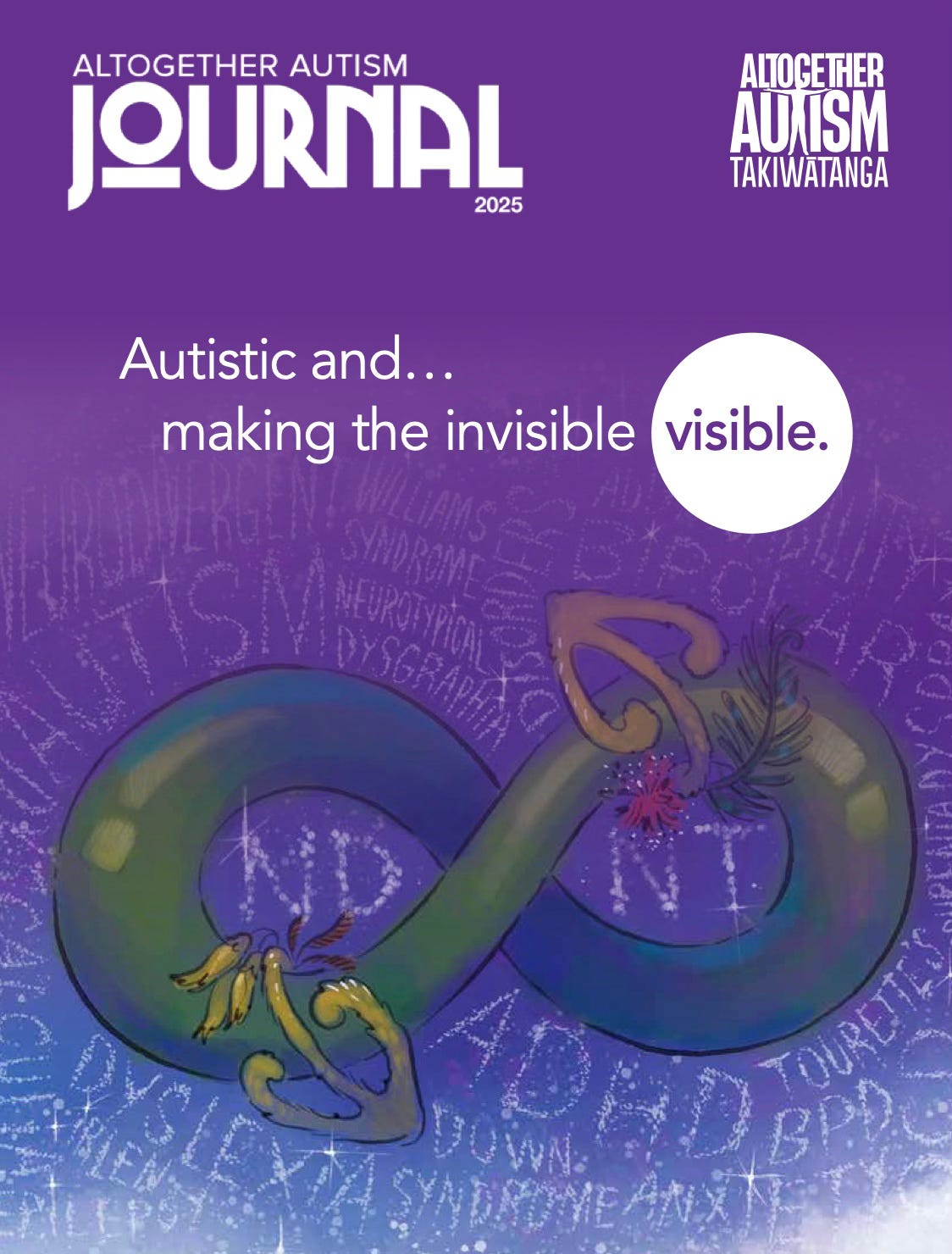
Here is the full Altogether Autism 2025 Journal on the topic of ‘Autistic and… making the invisible visible’. It is free to all and available in full for digital download.
One of Altogether Autism’s autistic researchers, Sara Meyer, was tasked with writing an article on menopause research, with my own piece then accompanying it within the journal.
Sara Meyer did a fantastic job explaining the nuanced intersection of autism and the menopause transition, covering:
• Brief summary of research status
• Mental health, physical health and victimisation
• Isolation and exclusion
• Challenging symptoms and Autistic experiences
• A Storm of transitions
• Positive Experiences and Silver Linings
• What helps Autistic people get through menopause
Sara’s article can be found in the digital journal on pages 30-33, and my piece follows on pages 34-35.
Autism, Menopause, and Reaching Breaking Point: A Hidden Crisis by Sara Meyer
Many Autistic people have highlighted menopause in their stories about diagnosis, suggesting that menopause was the point at which life went “off the rails” for them. For some, this meant looking back at their lifestyle and mental health history and recognising that they had been Autistic all along. For people who already knew they were Autistic, meanwhile, menopause has been described as the point where they became “more Autistic.” These individuals found it more difficult to “hide” their autism after menopause and experienced a general loss of coping skills.
Source: Sara Meyer at Altogether Autism. Full article available on website.
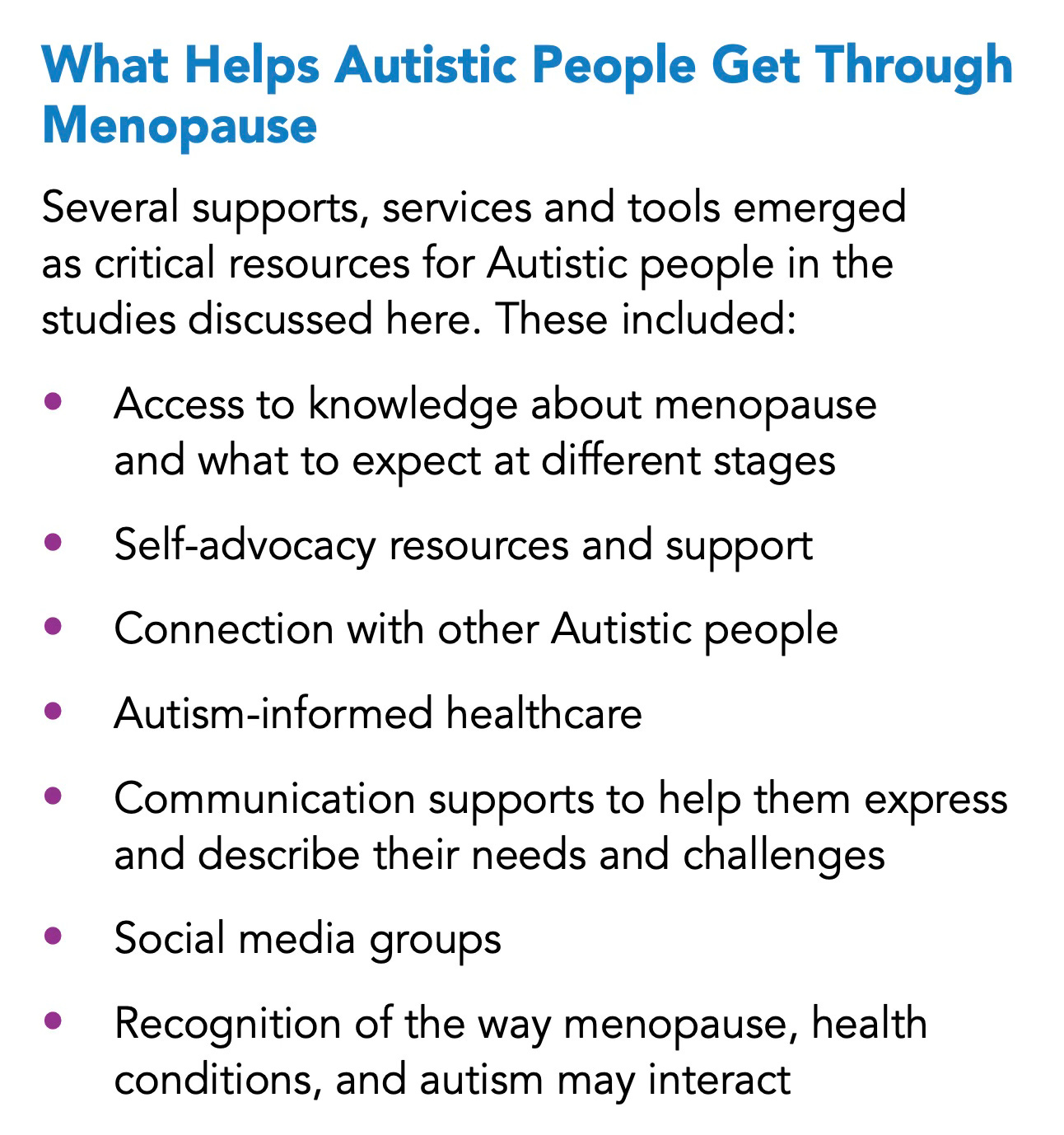
Sara Meyer’s article on Autistic Menopause: ⭐️⭐️⭐️⭐️⭐️
💕
My Lived Experience of Autistic Perimenopause
Full text:
The Autistic Perimenopause
Content note: this article mentions self-harming, suicide and abuse.
Sam Galloway shares her lived experience of ongoing Autistic perimenopause.
My experience of Autistic perimenopause is complex but not unique. The menopause is a life transition that is inevitable for all people with ovaries. I will soon be turning 44, and my life is still characterised and limited by hormonal fluctuations.
I was diagnosed Autistic aged 37, alongside my children's emerging neurodivergence. This was the time when my perimenopause symptoms began to appear. My symptoms began at a younger age than is average, so my doctors didn't take my concerns seriously when I told them I felt unstable and wanted to trial hormone replacement therapy (HRT). HRT is also known as menopausal hormone therapy (MHT). The first symptoms I noticed were extremely dry eyes and constant sensory overload.
My moods became unpredictable, I would experience what I refer to as 'The Rage', and have more frequent meltdowns and shutdowns.
My energy was very low, and I began to develop insomnia, which also affected my mood. This impacted my whole family, and the dreams I had had for my childrens' childhoods became out of reach as I had to instead focus on managing my menopausal mental health challenges.
I regressed frequently, with bouts similar to Autistic burnout, including loss of self-care and executive functioning skills. I became unable to cook family meals or wash my own hair and even had frightening episodes of forgetting how to drive or where I was going whilst driving.
My hormonal fluctuations were extreme and when they dropped they took my mood and capacity down with them. I experienced suicidal ideation and intrusive thoughts of how to end my life. When my hormone levels soared I was euphoric and felt capable of achieving anything.
I did not have the capacity to educate my family doctors on perimenopause so I looked for a private doctor to help me save my life. I was exhausted and feeling desperate. I waited months for an appointment since menopause doctors are in high demand in Aotearoa New Zealand. The Australasian Menopause Society has a database of doctors with an interest in menopausal and midlife medicine.
I was fortunate to find a trusted doctor who specialises in women's health and has an interest in neurodivergence, perimenopause, and how they intersect. Although she is not local to me, she offers remote consultations via telephone, video calls, emails, and a secure medical consultation portal.
Under her guidance my HRT was titrated to a level that manages my mental health symptoms - the most significant of all my menopausal issues. My other symptoms have included heart palpitations, tinnitus, breast pain, vaginal atrophy, disordered eating, insomnia, lethargy, loss of energy, memory loss, slower processing and reduced cognition, bloating, weight gain, emotional dysregulation, receding hairline, reduced tolerance for sensory inputs, and many more.
My HRT regimen currently includes ostrogen gel, ostrogen patches, vaginal ostrogen cream, testosterone gel and micronised progesterone capsules. It takes a lot of executive functioning skill to remember when to use each treatment, so I use timers, reminders on my phone and establish them into my daily personal hygiene routines.
Other treatments that I have trialled to manage my autistic perimenopause are the Mirena intrauterine device (IUD or "the coil"). It was beneficial because it stopped my constant bleeding that had been ongoing for months and had been causing me distress from sensory overload. However, the Mirena also caused extreme bloating, depressed mood and never felt right for me. I now think I may have progesterone intolerance, and that using progesterone aggravates my body and mind.
Yet it is essential that people with a uterus who are using ostrogen HRT also use progesterone to maintain the health of the uterine lining.
I was diagnosed with premenstrual dysphoric disorder (PMDD) recently and am now using hormone blockers to stop my own hormone production from my ovaries. This is because the rapidity of the hormonal fluctuations that occur for me in perimenopause trigger mood changes, cognitive regressions and risk of suicidal ideation.
It is not the specific hormone levels that are the problem so much as the fact that they change so fast from one hour to the next. Due to hormone blockers I am now in a temporary chemical menopause state so that I do not ovulate or bleed.I am awaiting an appointment with a gynaecologist. I am self-advocating for a hysterectomy and bilateral oopherectomy, which will mean that my uterus and ovaries are removed.
This would put me into a surgical post-menopausal state. This is a procedure for PMDD patients whose extreme hormonal fluctuations are so debilitating that they put them at increased risk of suicide.
My doctor explained to me that HRT is not a replacement of the hormones. HRT provides a buffer for our own changing hormone levels, so that our bodies and minds have a more consistent baseline.
Other ways I manage my Autistic perimenopause include lifestyle changes. I have a consistent bedtime and get up at the same time every day, although I still co-sleep with my neurodivergent
10-year-old. I do two 30 minute strength training sessions at home each week with a personal trainer who is also neurodivergent and in perimenopause. I try to eat a range of plant-based meals with lots of protein sources at regular times of day. I stop eating before 7pm and don't eat again for at least 12 hours overnight.
I stay hydrated throughout the day and don't drink caffeine after midday. I listen to yoga nidra tracks to promote rest in the daytime, and sleep stories at night to encourage deep sleep.
I ask others for support when I need it and I drop commitments if I realise that I don't have enough energy. I have a cleaner who maintains household hygiene and I have support with food preparation as and when needed.
I write because I find it cathartic and I work hard to build community and understanding around autistic perimenopause. Advocacy is important to me and is one of my core values.
I have been fortunate to be motivated by communication with research academics on the topic and by sharing insights with my online community at The Autistic Perimenopause: A Temporary Regression at Substack.
I am trying to find the motivation and cognitive capacity to start interviewing experts on my podcast and to write a book about neurodivergent menopause. In the meantime, I am focusing on preserving my mental health so I can continue to care for myself and my whānau*, whilst advocating on the side.
Sam Galloway (BSc Psychology with Hons, Primary PGCE, MA in Education) is a late diagnosed Autistic and ADHD midlife woman.
She advocates for Autistic and neurodivergent menopause as a distinct life phase that can lead to fluctuations and temporary regressions in functioning, mood and cognition.
Sam is the creator of The Autistic Perimenopause: A Temporary Regression on Substack, where she: supports others to self-advocate for their needs in Autistic perimenopause; has a growing community of readers and email newsletter subscribers; hosts her Auti Peri podcast (also available on Apple Podcasts); and offers a platform for others to share their lived experience in a regular feature called The Auti Peri Q&A Series
*Whānau is the Te Reo Māori word meaning family
But wait, there’s more!
The journal is jam-packed with brilliant articles on making the invisible visible, covering co-occuring conditions such as OCD, chronic illnesses, AuDHD, chronic fatigue and fibromyalgia. All available for you to read online for free here!
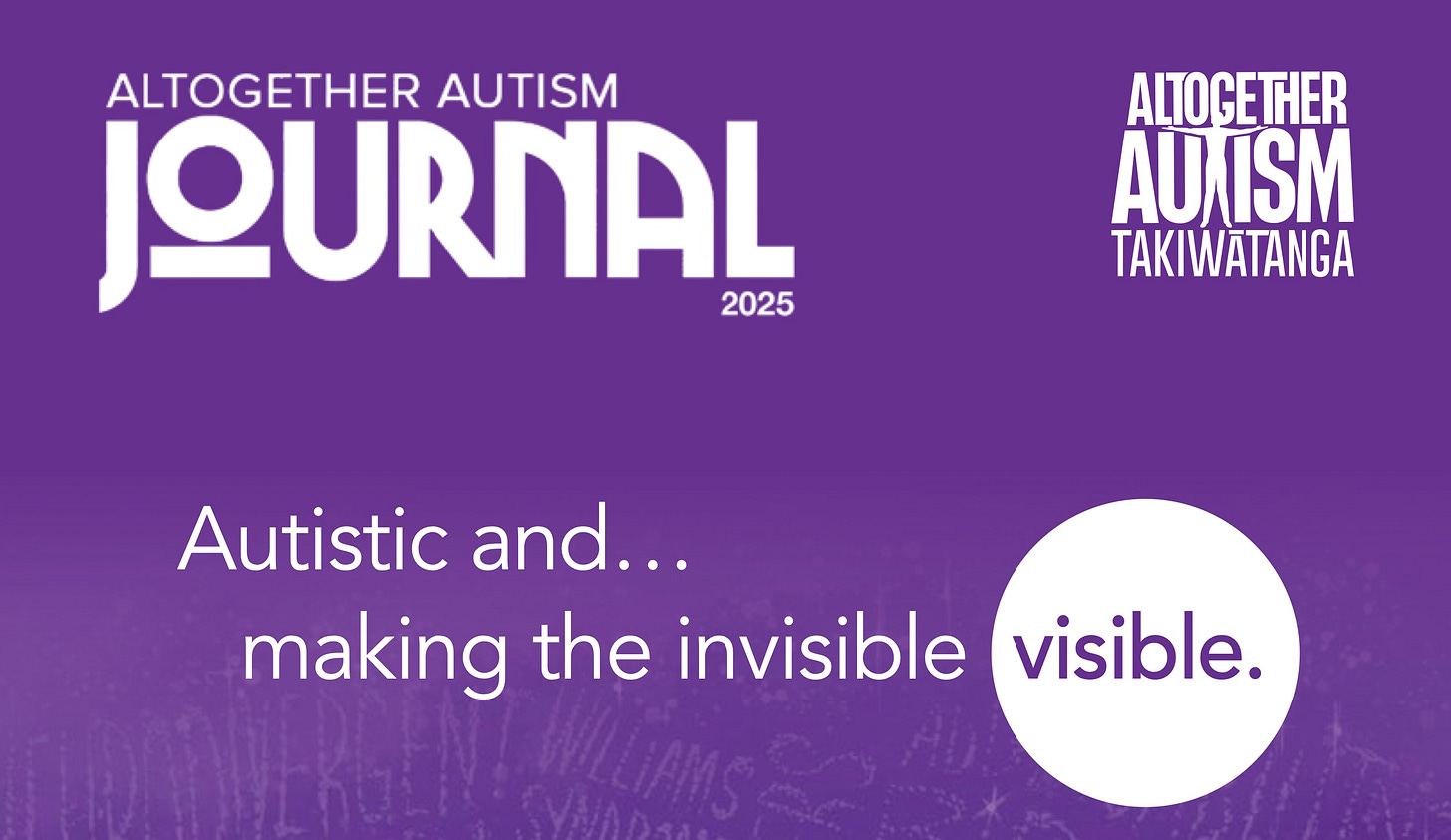
Contents page:
The Neurobirth Podcast (pages 36 and 37 in the journal) was a joint effort by two excellent Wellington-based neurodivergent midwives, Bronwyn Rideout and
.They also ran the Neurodiversity in the Childbirth Journey education day, of which I was honoured to have been on a discussion panel. In case you missed it:
Aotearoa New Zealand and cultural differences
Āe (yes), the journal is Aotearoa New Zealand centric, but that just adds to the richness!
Fellow neurodivergent
at recently went super viral sharing on Substack Notes that she had recently learnt that the Te Reo Māori ngā kupu (Māori words) for neurodivergence include Takiwātanga for autism, and Aroreretini for ADHD.I was so excited when I saw her Note that I waded in with this reply:
I have just skimread the other replies to Gabrielle’s Note and this one is great:
Our ethnic backgrounds do affect how we experience the world as neurodivergents, and also can determine the supports and acceptance available to us.
Culturally, we may think we feel the same sensory differences, and experience differing levels of challenge surrounding our social communcation capacity. But the ways we can mask and protect ourselves will not be the same for all ethnicities, and I would like to express my awareness of white privilege afforded to me, that I have not earned.
Although the Te Reo Māori words are beautiful, they are in no way widespread, and the indigineous population of Aotearoa New Zealand remain disadvantaged due to the ongoing destruction to their culture, caused by colonisation.
The non-native, European-descending people in Aotearoa New Zealand are known here as Pākehā.
As a white cis female person of privilege in a bicultural nation, I am also aware that I have unequal access to education and medical care. This should not be the case, but institutions and infrastructures are built to advantage some groups of people, whilst disadvantaging others.
Being an autistic person, I can see the inequality that most white non-autistics either do not see, or choose to ignore. Hardest of all for me to believe, is that some white people actually believe they are entitled to their privileges.
Currently, I am preparing for an upcoming gynaecology appointment, where I will be self-advocating for a hysterectomy (surgical procedure to remove the uterus/womb). I am feeling hopeful, terrified and intimidated at the prospect of needing to express all my issues to the specialist.
So what better way to outline all the reasons than by writing an article on it?! All weekend, when I wasn’t decorating the room I am trying to move my son into so that I can free up a larger “writing and podcasting/procrastinating room” for myself, I was working on the hysterectomy article.
Well, wouldn’t you know it has thrown up all sorts of trauma for me, not least re-living the ectopic pregnancy emergency surgery I had 14 or so years ago, since I am currently imagining myself going through with surgery and subsequent hospital recovery. Thus, the article is taking a while to emerge in words, since intrusive images are stemming my flow. I will keep working on that for you this week, with the goal to publish it with an audio voiceover next weekend. 🎧
Unsolicited Advice (sorry!)
In case you missed my recent post on periodontal disease (a severe form of gum disease) that occured in my early perimenopause, resulting in gum grafting surgery, here it is. It is also available as a podcast episode, as an audio voiceover recorded in my own despairing tones.
Please look after your teeth and gums because, whatever state they are in now, peri- and post-menopause hormonal fluctuations can rapidly escalate some people’s dental issues:
My Gum Graft, My Third Child: What Perimenopause Did to My Mouth
Content warning: if you experience fear of the dentist, please take care when reading.
That’s all for this weekend - and I say that loosely, as it is already Monday afternoon here, but it is still Sunday evening across the US, where currently 52% of my subscibers are! There are some advantages to living in the future!
I hope that you are well; that you enjoy exploring the Altogether Autism journal articles, and that you feel seen within the array of topics.
Let me know what you think in the comments.
Let’s keep busting the social taboos of autism and menopause, and make the invisible visible!
Thanks for taking this time out with me, I appreciate you!
Ragdoll cat tax to follow..! 🐈 🐈
Until next time,






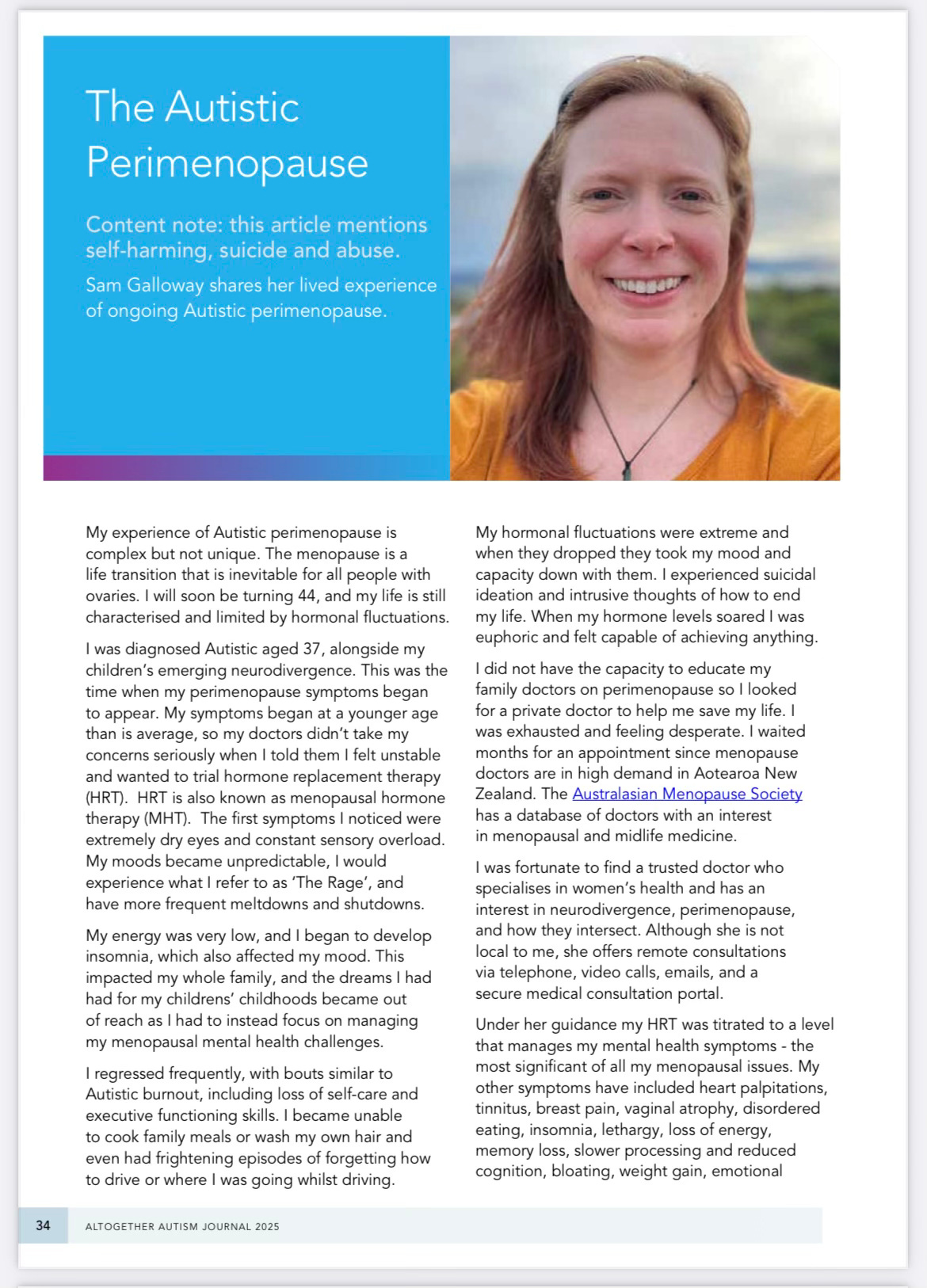
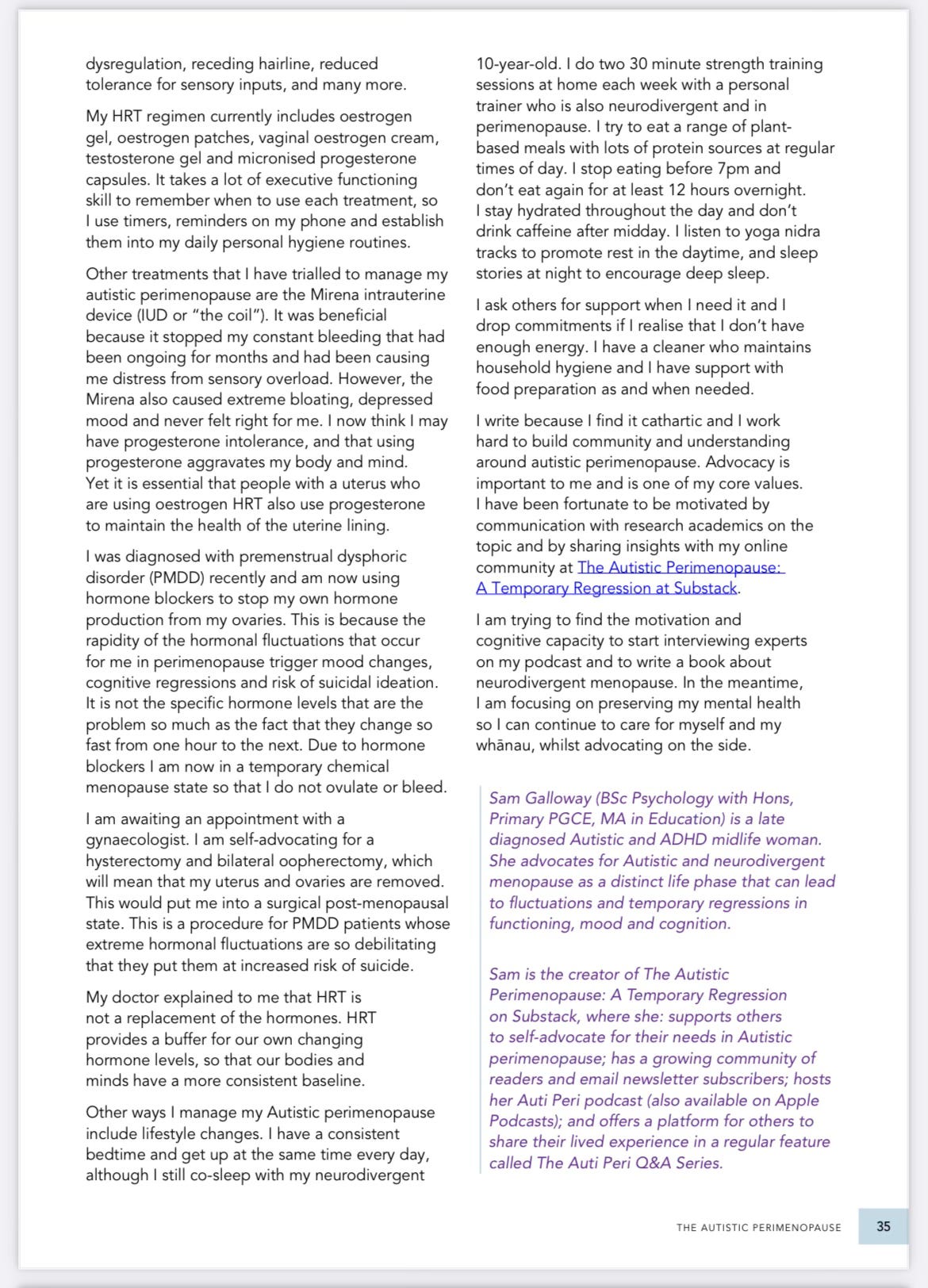




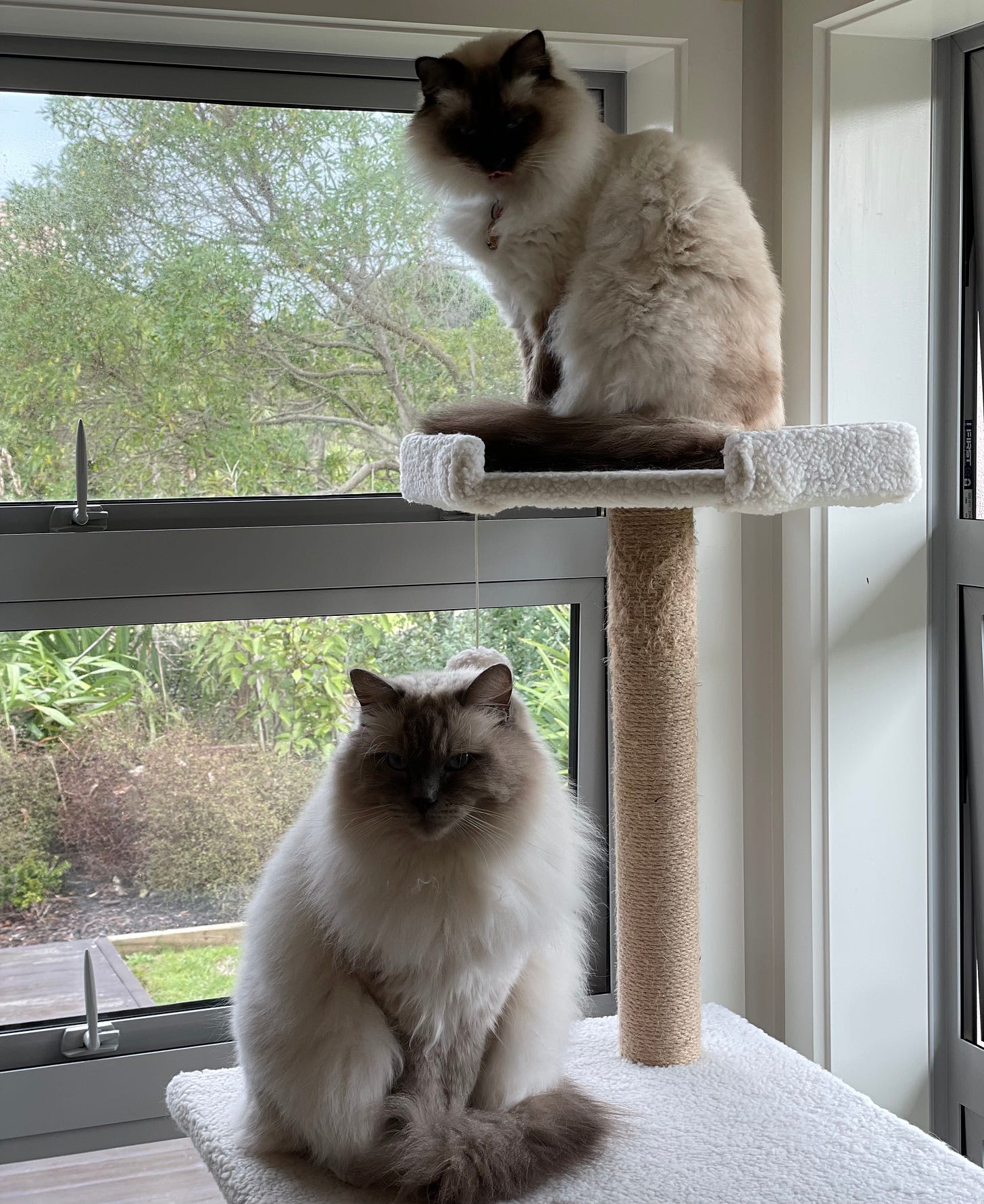
Thank you so much for this important work 🙏🙏🙏🙏🙏🙏
I suspect this wasn’t enough space to tell every one of these lived stories of yours!